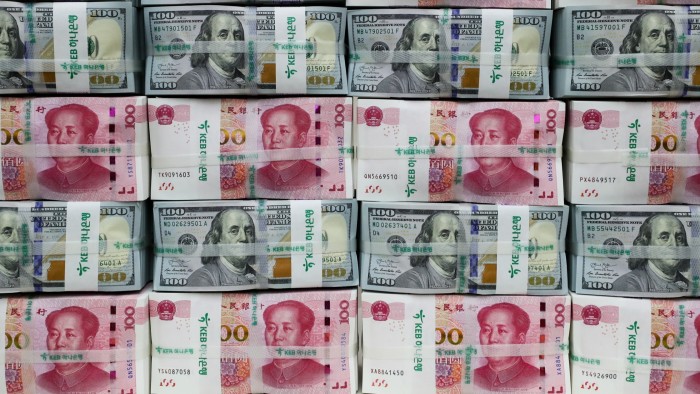Unlock the Editor’s Digest for free
Roula Khalaf, Editor of the FT, selects her favourite stories in this weekly newsletter.
The Chinese renminbi hit an 18-year low on Thursday as the currency became a serious flashpoint in trade tensions between the US and China.
The onshore renminbi, which trades in a band set by China’s authorities that limits daily moves to 2 per cent either way, on Thursday fell to its weakest level since 2007 against the dollar at Rmb7.351 before recovering.
The People’s Bank of China has for six consecutive sessions allowed a weakening in the official “fixing” rate for the onshore currency, in a sign it is willing to allow a modest depreciation to cushion the tariff blow for their exporters.
The move comes after US Treasury secretary Scott Bessent on Wednesday urged China not to further devalue its currency and called a weaker renminbi “a tax on the rest of the world”.
Market pressure for a weaker renminbi has been mounting. The offshore renminbi, which trades freely, on Tuesday hit an all-time low of Rmb7.42 against the dollar after President Donald Trump’s tariff blitz.
The Hong Kong dollar this week rose to its strongest against the US currency since 2021, an indicator of capital outflows from China into the city’s listed stocks.

Tensions have increased between the US and China after Trump on Wednesday announced a 90-day pause on reciprocal tariffs for countries that have not retaliated against US levies, limiting them to 10 per cent, while raising those on China to 125 per cent.
The move prompted fears of a currency clash between Beijing and Washington that could spark a serious escalation in global trade tensions as other countries come under pressure to mount devaluations of their own.
People familiar with China’s currency management played this down, saying the authorities were not planning a shock devaluation, which could destabilise markets and lead to capital flight while also hitting the domestic economy.
The drop in the daily fixing by the PBoC has been relatively small since Trump last week announced a universal 10 per cent tariff, suggesting the authorities are managing the renminbi as it comes under market pressure rather than preparing for currency wars.
One foreign exchange trader at a Chinese bank who receives orders from the PBoC to buy or sell dollars in order to defend the renminbi told the Financial Times that the authorities’ aim was to “control the pace of depreciation” with less aggressive intervention.
“Our base case is that it will be an orderly, controlled devaluation,” said Kaanhari Singh, head of Asia cross asset strategy at Barclays.
“On balance a meaningful devaluation looks less likely — China carries out more intraregional trade now as well as trade with the US, and Beijing is unlikely to want to destabilise [Asian] trading partners,” said Edward Evans, emerging market equities portfolio manager at Ashmore.
Additional reporting by Joseph Cotterill in London
How China manages the renminbi
Every day, authorities calculate a central parity rate against the dollar, also known as the “fixing” rate.
Traders regard this rate as one of the central bank’s main tools to communicate policy guidance.
The market exchange rate is allowed to fluctuate within plus or minus 2 per cent of the fixing rate. This is known as the band.
The authorities have a wide range of formal and informal tools to intervene and keep the market rate within the band, including mobilisation of cash sitting in state banks. China has been trying to allow more flexibility in the exchange rate, adjusting the fixing rate over time to reflect market pressures.
Until recently, the fixing rate was unusually stable even though the market rate was close to the weaker end of the band. That implied depreciation pressures on the renminbi that the authorities were resisting.


